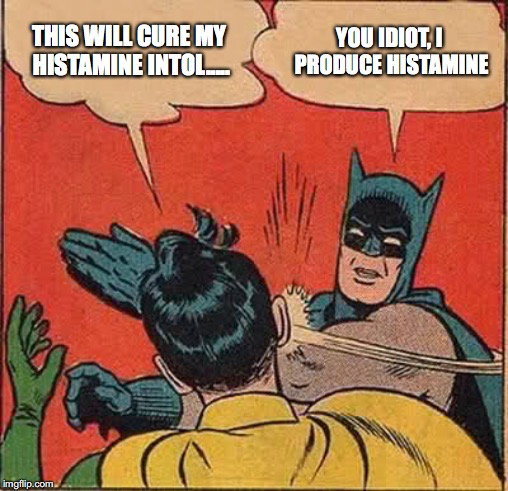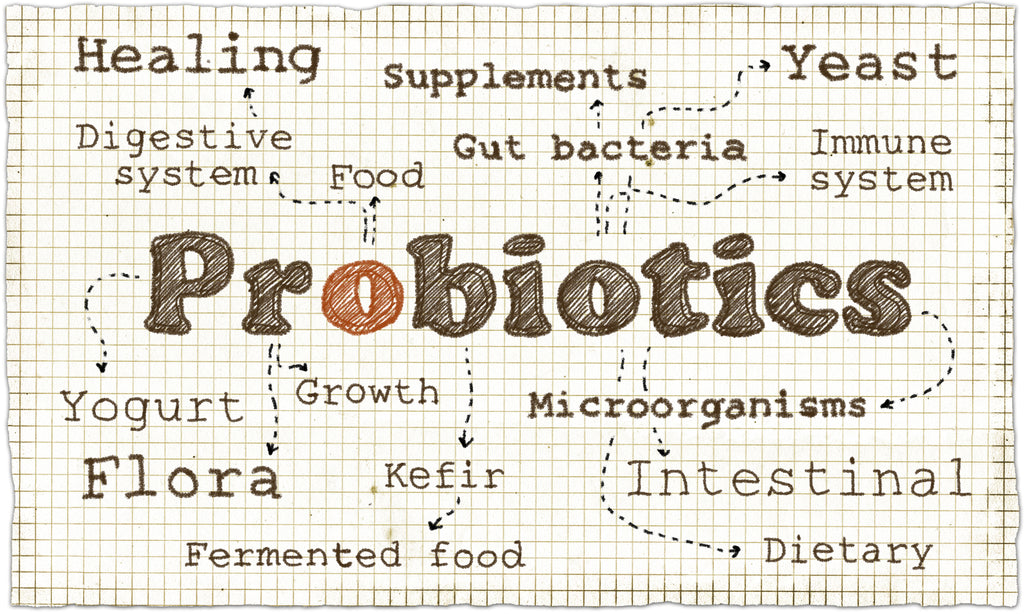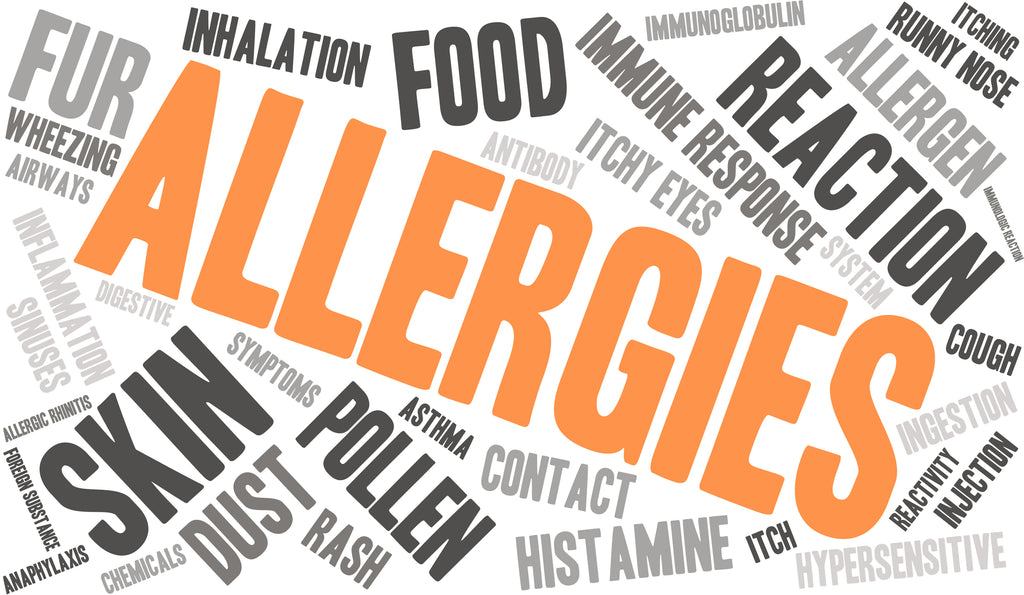Low Histamine Probiotics: How to Balance Your Gut and Stop Symptoms for GOOD
Probiotics are a lot like Batman.
What?!
Just like Bruce Wayne combines his light and dark sides to fight evil—sometimes blurring the lines between right and wrong to clean up Gotham’s streets—probiotics too combine a light and dark side in the war against histamine in your stomach.
OK, enough of that. You don’t have to suffer from histamine intolerance if you get Batman, er…, low-histamine probiotics proven to degrade histamine! Follow this guide and you’ll stop sniffling, running to the toilet, and breaking out in rashes! If you're just looking for our recommended product and don't want to read anything else, HERE is the best low histamine probiotic available.
Probiotics for Histamine Intolerance: Why Your Probiotics Might Be Hurting You!

Histamine intolerance is a sign that you’ve got way too much histamine in your system. You’re either taking in too much from your diet (read our article on low histamine diets) or you lack the enzymes that metabolize it (more on the science below).
When you’ve got too much, this causes an imbalance that results in negative symptoms like allergies, stomach problems, fatigue, or worse.
Probiotics are one of your best weapons in the battle for control of your gut because different strains have the ability to either produce or degrade histamine. This is a strain-specific feature, so some will help by degrading histamine and others will hurt by producing it. (This works completely differently than our histamine blocking DAO supplement (also here from Amazon).
In that way, they’re like a complex.
So, getting the RIGHT kind is extremely important, or you’re just going to continue fighting off histamine overloads while eating that yogurt.
We’ll get to that in a second. But first…
Symptoms of Histamine Intolerance
Histamine intolerance is really hard to diagnose. Do you REALLY have histamine intolerance or do you just have allergies, a cold, or a stomach bug? So many of these symptoms overlap that it’s hard to pinpoint exactly what’s wrong with you without a doctor visit.
Here are the most common symptoms of a histamine intolerance:
- Common allergy symptoms - runny or stuffy nose, leaky eyes, fatigue
- Headaches
- Vomiting
- Digestive issues
- Nausea
- Rashes like hives
Serious cases can cause dizziness, cramps, high blood pressure, or even high anxiety.
We don’t have to tell you how bad your allergies suck. You and all of your cat-owning friends are well aware.
Back to Probiotics and Histamine

OK, cool…so what does all this have to do with the yogurt you just bought? Good question!
Probiotics are microorganisms with a ton of health benefits, most of them for your gut. When taken correctly, they can restore balance to your belly and stop the overproduction of histamine.
The problem is that most probiotics actually contain bacteria that produce a lot of histamine. Normally, this wouldn’t be a problem. Your body would metabolize and you’d be on your merry way. But histamine intolerant people don’t work that way. Their systems can’t handle the histamine overload, and this sends them running for the toilet or box of tissues (or both!).
So now you’ve got a conundrum: You need probiotics to restore gut order, but probiotics are actually the reason for DISORDER.
What can you possibly do? Don’t worry, there’s a solution. There are actually low-histamine probiotics that contain just enough of the bacteria to restore balance without overloading you with histamine and throwing you into disarray. But first, let’s get into the nitty-gritty of what’s going on.
Did You Know?: Only about 1% of the total population is histamine intolerant? Make sure it’s not another, more serious condition before proceeding!
Why is Your Histamine Production Going Haywire?

To understand the healing powers of antihistamine probiotics, you need to understand the brutal struggle for power taking place in your gut as we speak. Let’s jump inside the Magic VitaMonk School Bus and take a little trip. Next stop, your gut.
We have arrived… (Oh, God. What did you have for lunch?)
Inside your belly are trillions of bacteria, and they play a key role in everything from your immune health to the way your brain works. When it comes to probiotics, only two bacteria matter:
- Bacteria that turn histidine to histamine: When you sample fine cheeses in Amsterdam, certain bacteria take the histidine in that aged gouda and convert it to histamine, which is then sent off into your system to fight invaders, produce acid, and a number of other functions.
- Bacteria that metabolizes histamine: Another form of bacteria produces diamine oxidase (DAO), the enzyme responsible for metabolizing histamine. If you don’t have enough DAO, then histamine runs rampant, goes on a power trip, and starts attacking every little thing in your system (resulting in allergic symptoms).
Probiotics are gut-balancing bacteria that could help fight back against histamine intolerance symptoms by brokering peace between these two forms of bacteria and restoring order.
The problem is that not all probiotics are alike. That’s the problem with taking probiotics to cure your C5H9N3 issues. Some can even take low histamine foods and turn them into high histamine foods!
You can’t just grab any ol’ probiotic food from the shelf or take a probiotics supplement for your histamine issues. That’s actually the worst thing you can do.
We suffer from the same histamine issues that you do. We’ve managed to overcome them by sticking to low-histamine probiotics and avoiding histamine producing probiotics.
Here’s the definitive list!
Low-Histamine Probiotics
There are a ton of alleged “low-histamine probiotics” out there, but we’re only going to stick to the ones that are proven to work or that have at least shown very promising signs:
- Bifidobacterium longum: Is one the most important bacteria in the body and is responsible for everything from fighting infections to digesting dietary fiber. It is also one of the most potent antihistamine probiotics. In one 2008 study, mice who were administered a Bifidobacterium longum concoction exhibited significantly lower allergic effects through the suppression of histamine [1].
- Bifidobacterium infantis: A cousin of the longum strain, infantis is one of the earliest bacteria found in the infant gut, and it helps us maintain a healthy digestive tract. It was part of the concoction from the previous study that helped reduce histamine and allergies in mice.
- Lactobacillus gasseri: This probiotic is known for suppressing harmful bacteria and aiding your immune system. Research has shown that the isolate forms of L. gasseri degrade histamine [2].
- Lactobacillus rhamnosus: rhamnosus stabilizes mast cells and reduces histamine receptor sensitivity in humans [3].
- Bifidobacterium lactis: Shown to contribute to breakdown of histamine as well as other substances [4].
- Lactobacillus plantarum: Also contributes to the breakdown of histamine [5].
Honorable Mention - Lactobacillus Reuteri: Friend or Foe?
We want to clear the air on our good friend lactobacillus reuteri. Think of him like the alleged criminal that loses the court of public opinion only to be found innocent later by a court of law. His name is now vindicated!
Reuteri was once thought of as a “histamine producing” probiotic because it converts histidine to histamine. But fascinatingly enough, this histamine reduces cAMP, which reduces the inflammatory response! So, it’s safe to eat for histamine intolerant people! VINDICATION!!!
Histamine Producing Probiotics
Avoiding histamine producing probiotics at all costs, even if it means putting back that scrumptious vanilla flavored yogurt in your hand right now.
While more scientific research needs to be done to definitively prove which probiotics need to be avoided for histamine intolerance, there’s at least enough evidence for us to recommend avoiding:
- Lactobacillus casei
- Lactobacillus bulgaricus
- Streptococcus thermophilus
- Lactobacillus delbrueckii
- Lactobacillus helveticus
Hope this helped clear up the confusion on low-histamine probiotics. Just like a complex movie hero, or the Dark Knight himself, they’re a mixture of good and evil.
Probiotics, like people, are complicated. Sometimes good people do bad things. Sometimes bad people do good things. Probiotics are the same. You just need to know which ones to take and which ones to avoid. Stick to what science has proven and you’ll be fine!
References
[1] https://www.jstage.jst.go.jp/article/jphs/107/2/107_08028FP/_article
[2] https://www.ncbi.nlm.nih.gov/pubmed/28885051
[3] https://www.ncbi.nlm.nih.gov/pubmed/21390145
[4] https://link.springer.com/article/10.1007%2Fs00217-012-1777-9
[5] https://www.ncbi.nlm.nih.gov/pmc/articles/PMC3316997/
Updated January 21, 2020